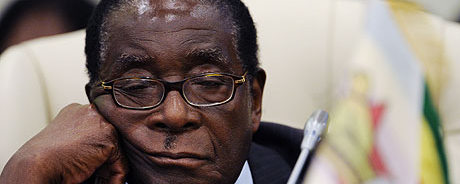
POLLS without key reforms are looming in Zimbabwe after President Robert Mugabe yesterday unilaterally declared July 31 as the date for the next elections to bring closure to the acrimonious five-year coalition government.
Report by Njabulo Ncube
Mugabe yesterday gazetted Statutory Instrument 85 of 2013 to proclaim the election date as July 31 setting the stage for yet another bruising fight with his coalition partners in the power-sharing government.
The Zanu PF leader’s action follows a successful challenge to the Constitutional Court by Jealousy Mawarire a fortnight ago.
But Tsvangirai, Ncube and even South African President Jacob Zuma, the Sadc-appointed facilitator in the Zimbabwe crisis, have demanded electoral and legislative reforms ahead of the polls, in particular wide-sweeping security sector and media changes.
Sadc is due to hold a crisis summit on Zimbabwe ahead of polls tomorrow.
The MDCs accuse the State security agents, the military and the police of being complicit in the deaths of more than 200 of their supporters in the bloody 2008 elections.
Mugabe and his Zanu PF have flatly refused to tinker with the security sector and media, claiming it would be tantamount to effecting and fast-tracking regime change.
- Chamisa under fire over US$120K donation
- Mavhunga puts DeMbare into Chibuku quarterfinals
- Pension funds bet on Cabora Bassa oilfields
- Councils defy govt fire tender directive
Keep Reading
Two years ago, Cabinet ordered Media, Information and Publicity minister Webster Shamu to reconstitute the boards of the Broadcasting Authority of Zimbabwe and the Zimbabwe Broadcasting Corporation in line with the spirit of inclusivity, but this has come to naught.
Analysts yesterday said it would be suicidal for the country to go for elections under the current status quo with a partisan security sector and public media still under the grip of the President’s Office.
Trevor Maisiri, a senior political analyst with the International Crisis Group, said Mugabe had proclaimed the date because he wanted to go to Sadc armed with a tool for negotiation.
“So instead of the meeting focussing on openly discussing an election date, it will focus on one of two things, either convincing and requesting Mugabe to consider various propositions to allow for a consensual way forward or convincing and requesting the MDCs to agree to Mugabe’s proclamation,” he said.
Maisiri said whichever way, Mugabe goes to the Sadc meeting with the “keys to the decision-making doors”.
The Sadc gathering is expected to discuss funding for the pending polls, but analysts say money for elections will definitely be conditional to a consensual way forward. They argue that it would be suicidal for Sadc to consider funding elections where there is no consensus on election dates and process to that election.
Sadc must insist on roadmap
Dumisani Nkomo, the chief executive of Habakkuk Trust, a local think-tank, said Mugabe’s proclamation was a difficult proposition because the elections are supposed to be held in conformity with the Sadc roadmap on elections, which include key reforms to the media and the security sector. Nkomo said some cosmetic reforms might be carried out so that the country is deemed to have a credible election and acceptable results and a legitimate government being formed.
“Sadc should insist on the election roadmap and I am sure this will determine when elections will be held,” he said. Mugabe’s partners in the coalition argue that July 31 is practically impossible citing logical and financial challenges. But Blessing Vava, a spokesperson for the National Constitutional Assembly, said with or without reforms, Mugabe’s proclamation was a progressive step for the country.
“He (Mugabe) had no choice but to abide by the ruling made by the Constitutional Court that elections must be held by July 31. “Sadc will have to comply with the dates set by the President and the deliberations will be mainly about funding rather than the dates.
“For the MDC, they have always been dribbled by Mugabe left right and centre. They sponsored a flawed constitution that had an Executive President, and Mugabe is now using those powers as outlined in the new Constitution,” he said.










